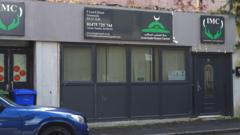Why Was a Microsoft Employee Arrested for Protesting Israel Contracts at HQ?

This week, protests erupted at Microsoft’s headquarters in Redmond, Washington, led by a group of employees and community members opposing the company's contracts with Israel. The demonstration, known as “No Azure for Apartheid,” has resulted in multiple arrests, including at least one current Microsoft employee. The protests highlight ongoing concerns about the ethical implications of Microsoft’s cloud services being used by the Israeli government.
Last updated: 06 October 2023 (BST)
Key Takeaways from the Protests
- A Microsoft employee was arrested amid protests against the company's contracts with Israel.
- The “No Azure for Apartheid” group claims multiple arrests occurred, including current and former employees.
- Protesters disrupted Microsoft events, calling attention to the ethical concerns surrounding cloud services.
- Microsoft is conducting a review of allegations regarding the use of its Azure platform in Israel.
- The protests are part of a broader movement advocating for human rights and ethical business practices.
The Background of the Protests
The protests at Microsoft’s headquarters stem from deep-seated concerns about the company’s involvement with the Israeli government. The “No Azure for Apartheid” group asserts that Microsoft’s cloud services, particularly the Azure platform, are being used to facilitate actions that violate human rights in Palestine. This sentiment has resulted in significant unrest among employees and community members who feel compelled to voice their opposition.
In recent months, the group has ramped up its efforts, organising protests that have drawn attention to Microsoft’s contracts, which they argue contribute to the ongoing conflict. Their most recent actions included setting up a “Liberated Zone” encampment at Microsoft’s campus, which served as a focal point for their demonstrations.
Details of the Arrests
On Tuesday, the first day of protests, attendees occupied a plaza at Microsoft’s headquarters. While the initial gathering was reportedly peaceful, tensions escalated on Wednesday, leading to the arrests of 18 individuals, including at least one Microsoft employee. Abdo Mohamed, an organiser from the No Azure for Apartheid group and a former Microsoft worker, confirmed that the arrested individuals comprised a mix of current and former employees, along with local community members.
The Redmond Police described the protesters' actions as aggressive, noting that some individuals attempted to block pedestrian pathways and create barriers using furniture from the vicinity. This escalation resulted in a more forceful police response, culminating in a series of arrests that highlight the growing friction between the protesters and law enforcement.
Historical Context of Microsoft’s Involvement
Microsoft’s relationship with the Israeli government has faced scrutiny for years. The company’s cloud services have reportedly been tied to significant data collection efforts by Israeli authorities, including the storage of vast amounts of communication data from Palestinian citizens. A recent investigation published in The Guardian revealed that Microsoft’s Azure platform is allegedly used to process and store recordings of up to a million calls per hour, raising alarms over privacy and human rights violations.
This context has served as a catalyst for the protests, as concerns mount over the ethical implications of technology companies supporting government actions that are perceived as oppressive. Activists argue that corporations like Microsoft must be held accountable for their involvement in such matters.
Protest Strategies and Previous Incidents
The No Azure for Apartheid group has employed various tactics to draw attention to their cause. Earlier protests included disruptions during Microsoft’s significant events, such as the company’s 50th anniversary celebration, where former employees publicly accused Microsoft’s leadership of profiting from conflict. These protests have been increasingly visible, demonstrating the commitment of activists to challenge corporate behaviours they view as unethical.
Moreover, reports indicate that Microsoft has taken measures to prevent the spread of information regarding Palestine within its corporate communications, including blocking emails containing the term “Palestine.” Such actions have further intensified the feelings of discontent among employees and supporters of the protest movement.
Microsoft’s Response
In light of the protests and the allegations surrounding the use of its Azure services, Microsoft has stated that it is conducting a thorough and independent review of the claims. A spokesperson indicated that the company is committed to upholding its human rights standards in the Middle East and is taking steps to address unlawful actions that disrupt business or harm individuals.
This review is crucial, as it reflects the company’s awareness of the growing public scrutiny it faces regarding its business practices. The outcome of this investigation remains to be seen, but it is likely to influence Microsoft’s future engagements in the region.
What Happens Next?
As the protests at Microsoft continue, the company will need to navigate the complex intersection of corporate responsibility and political engagement. The outcome of the independent review could lead to significant changes in Microsoft’s contracts and practices, particularly if they find evidence supporting claims of human rights violations.
Moreover, the ongoing protests signal a larger movement within the tech industry, where employees are increasingly advocating for ethical business practices and holding their employers accountable. This trend may inspire similar actions across other companies, leading to a broader reevaluation of corporate ethics in the tech sector.
In conclusion, the events at Microsoft’s headquarters reflect a growing discontent among employees and activists regarding the ethical implications of corporate partnerships with governments. As Microsoft faces scrutiny, the outcome of these protests and the subsequent review will be pivotal in shaping the company’s future direction in the region. How will Microsoft respond to these calls for accountability, and what implications will this have for the tech industry as a whole?
#MicrosoftProtests #HumanRights #TechEthics
FAQs
What are the reasons behind the Microsoft protests?
The protests are primarily against Microsoft’s contracts with the Israeli government, which critics argue contribute to human rights violations in Palestine.
How many people were arrested during the protests?
A total of 18 individuals were arrested during the protests, including at least one current Microsoft employee.
What is the No Azure for Apartheid group?
No Azure for Apartheid is a protest group formed by current and former Microsoft employees advocating against the company’s cloud contracts with Israel.
What actions did the protesters take during the demonstrations?
Protesters occupied areas of Microsoft’s campus, set up encampments, and disrupted company events to draw attention to their cause.
What is Microsoft’s response to the protests?
Microsoft has stated that it is conducting an independent review of allegations regarding its Azure platform’s use in Israel and is committed to upholding human rights standards.
Published: 2025-08-21 08:33:08 | Category: Trump GNEWS Search



